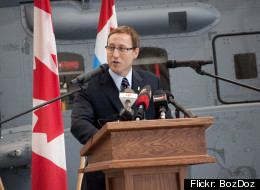 OTTAWA - The Harper government is examining whether to dispatch Canadian troops to help train an African force whose purpose would be to take back a vast swath of Mali from an off-shoot of al-Qaeda.
OTTAWA - The Harper government is examining whether to dispatch Canadian troops to help train an African force whose purpose would be to take back a vast swath of Mali from an off-shoot of al-Qaeda.Defence Minister Peter MacKay, speaking in Halifax Sunday, said what form of military assistance can be provided to a growing international swell is something that's under active discussion.
"What I can tell you is that we are contemplating what contribution Canada could make," MacKay said at an announcement related to rental housing rates on military bases.
The United Nations recently decided to back a proposal from Economic Community of West African States — ECOWAS — to send 3,300 troops to the region.
Canadian special forces troops were active in the west African country for several training missions prior to the coup last March that installed a shaky interim government. Those missions also took place before Islamic Maghreb — known as AQIM — overran much of the northern portion of the impoverished nation.
"We are not at a point where we would be making an announcement, but as you know, training is something that the Canadian Forces is particularly adept at doing," MacKay said. "We've demonstrated that repeated in the last, well, throughout our history, but certainly the training mission in Afghanistan is a testament to that commitment and that ability and something that has garnered the admiration of recipient nations but also other countries who emulate Canadian training techniques."
Mali, a landlocked country bordering on Algeria and Niger, has been one of the biggest recipients of Canada's foreign aid.
France has been at the forefront of organizing an international response, including the African-led international force which could be trained by western troops.
Malian Prime Minister Diango Cissoko, last week, pleaded for military intervention "as soon as possible."
The African troops would need training in desert combat and counterinsurgency warfare.
Canada could also provide what the military call enablers: communications, intelligence, transport planes or helicopters for airlift.
But it is in the area of special forces, more specifically counter-terrorism training, that the Canadian military would likely make the most immediate contribution.
Briefing records for the commander of the country's special forces show members of a highly-trained, ultra-secret regiment have conducted at least three training mission in the country between 2010 and 2011.
"Each involved embedding training Canadian Special Operations Regiment (CSOR) trainers within" training units from other countries, said a Sept. 27, 2011 briefing to Brig.-Gen Denis Thompson.
But the memo took pains to emphasize there would be no combat, and much like Afghanistan, the troops would be restricted to inside the wire instruction.
"This task is limited in scope to training only. CANSOFCOM members will not engage in any form of operational mentoring of Malian forces," the note said.
It added that Canadians retained control of the training teams, but also the engagement in Mali was considered by former chief of defence staff retired general Walt Natynczyk to be a "recurring operation in the Trans-Sahel Region."
The fact special forces have experience working the country is a bonus, should the government commit to a training mission, said the general in charge of the regiment.
"Does it inform anything that may or may not happen in the future? I don't think it informs any policy decisions that have to be made, but it certainly reassures people that there's enough tactical acumen inside the CANSOFCOM — and quite frankly in my humble opinion inside the Canadian Army — to pick up and help out in any one of these countries if that was the decision that was made," said Thompson in a recent interview with The Canadian Press.
Original Article
Source: huffington post
Author: Murray Brewster
No comments:
Post a Comment